Whether you’re a full-time RVer or a weekend road warrior, you’ve no doubt asked yourself if you can plug your RV into a house outlet.
After all, you’ve probably witnessed friends who are moochdocking – the art of plugging a travel trailer into a friend’s house to mooch off their electricity.
Or maybe you’ve seen someone with a big garage or shed for their RV who seems to have their camper powered up all the time.
Which begs the question – can you plug your RV into your house electrical outlet?
The short answer is yes, you can plug your RV into a household electric system. But there are limitations including the sorts of RV appliances you can run and the amount of time you can run an RV on household electric. For example, RVs wired for 30 amp electricity are easier to plug into your house than RVs with a 50 amp hookup. And you need to be careful to understand how much your home circuit breaker can withstand.
And you also need to decide if you’ll use an adapter to plug your camper into your house or if you’ll hire an electrician to wire up a special plug for your RV.
So let’s break it all down for you here – what sorts of campers you can plug into your house, how you should plug them in, and the limitations that come with plugging your RV in at home.
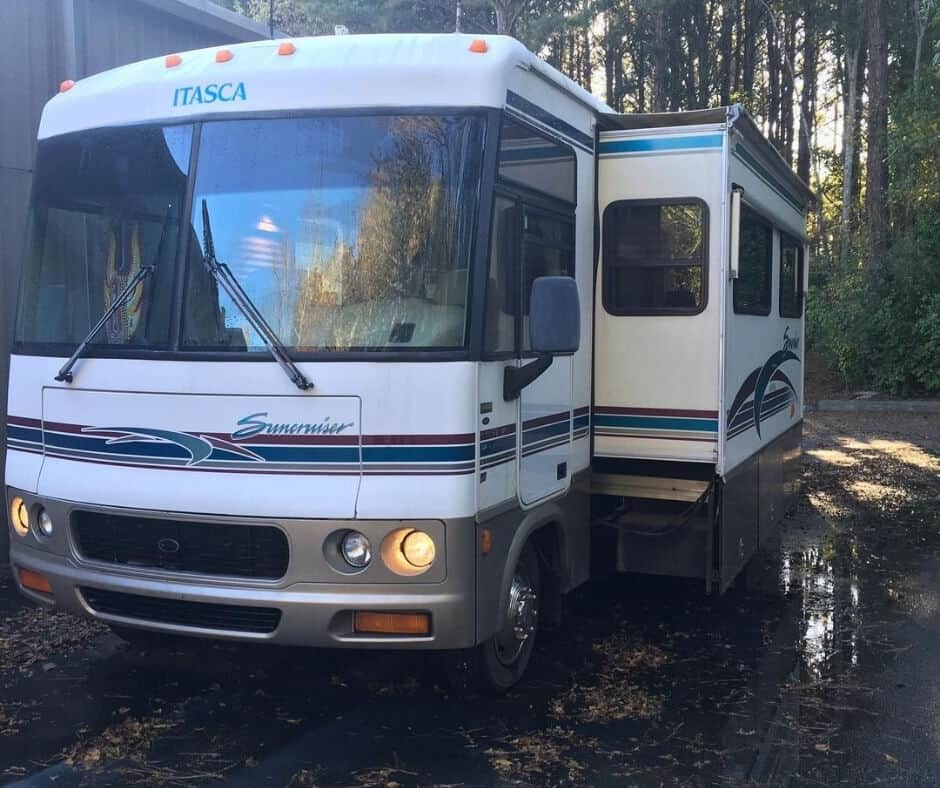
Is it Possible to Plug an RV Into a House Electric System?
Yes, you can plug your camper into a household outlet.
But you’re probably asking yourself:
- How can I plug a 30 amp RV into my house?
- How can I plug a 50 amp RV into my house?
- And, should I simply plug my RV into my house outlet or do I need a special plug?
The answers to the above questions depend on what type of camper you have, how you plan to use your camper at your house, and the specifics of your home’s electrical system.
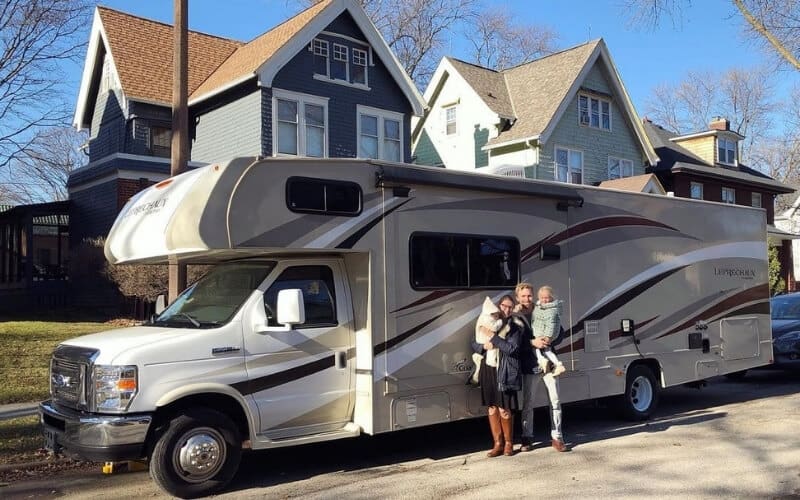
What Types of Campers Can I Plug Into My House?
Any modern RV, travel trailer, camper, or pop up can be plugged into your house. This is true for both 30 amp and 50 amp RVs.
But plugging your RV into a house outlet does not mean that it will run like normal.
Unless you plan to make some modifications to your home electrical system, you’ll be limited on how you can use power in your RV.
This is especially true if you have a larger motorhome with a 50 amp hookup.
Understanding the Basics of RV Electric Will Help You Know Your Limitations When Plugging Your Camper in at Home
Before deciding how to plug your camper into a house outlet, it’s important to understand the basics of RV power systems:
1. RVs generally have one of two types of power – 30 amp or 50 amp.
-
30amp RV plugs have 3 prongs and are larger than your standard home plug.
-
50amp RV plugs have 4 prongs and are also larger than a standard home plug.
-
50amp plugs and power systems are generally found on larger RVs – especially those with two or more air-conditioners on the roof.
2. Some smaller pop-up or teardrop campers will have a standard household 110volt plug coming out of them.
-
Because pop-up/teardrop campers have limited power needs, they can usually be plugged into household outlets without modification.
3. Campers also have an internal 12 volt power system that powers lights and other small electronics.
-
Your RVs 12 volt power system exists so you can use your camper’s onboard batteries to power small electronics (e.g. lights) when you are not plugged in.
-
When you plug your RV into your house, your 12 volt system will be powered because your RV has a converter that will take some of the 110 volt power from your house and convert it to 12 volt.
-
When you plug into a house outlet, your RV will also charge its internal batteries so you can use the 12 volt system when you unplug.
How Can I Run Electricity From My House To My RV?
When it comes to plugging your RV into your house, you have two main options:
-
Use an adapter to plug your RV cord into a standard household outlet.
-
Hire an electrician to wire a 30 or 50 amp plug into your home (this is the same outlet you use at most RV parks).
If you go with option 1, the adapter will cost between $10-$30. Be sure to buy an adapter that is specific for a 30 or 50 amp plug, depending on which you have.
Option 1 will also limit you on what appliances you can run in your RV. More on that in a moment.
If you go with option 2, you could spend anywhere from $200-$1,000+ having an electrician wire up the appropriate plug.
With option 2, you won’t need an adapter because your electrician will wire up the exact outlet your RV requires.
Option 2 will usually allow you to run your RV just as you normally would at an RV campground – using your air-conditioner and other appliances without issue as you stay in your camper.
How To Plug In An RV Into House Electric
Let’s assume you don’t want to shell out for an electrician and you go with option 1. Here are the steps you’ll want to follow to plug in an RV to your home’s electrical system:
Plugging Your Camper in at Home: What Appliances Can You Use?
When you plug your RV into a standard household outlet, you will be limited on the appliances you can use in your RV.
Plugging your camper into your house is great for running small appliances like most RV fridges, the converter that charges your RV batteries, interior lights, and small plug-in electronics (e.g. phone or computer chargers).
Generally speaking, when your camper is plugged into your house, you could run a space heater or a hair dryer or your microwave.
But never try to run two power hungry devices at the same time when your travel trailer is plugged in at home.
If you do, you’ll likely trip your home circuit breaker and cut power to your entire RV.
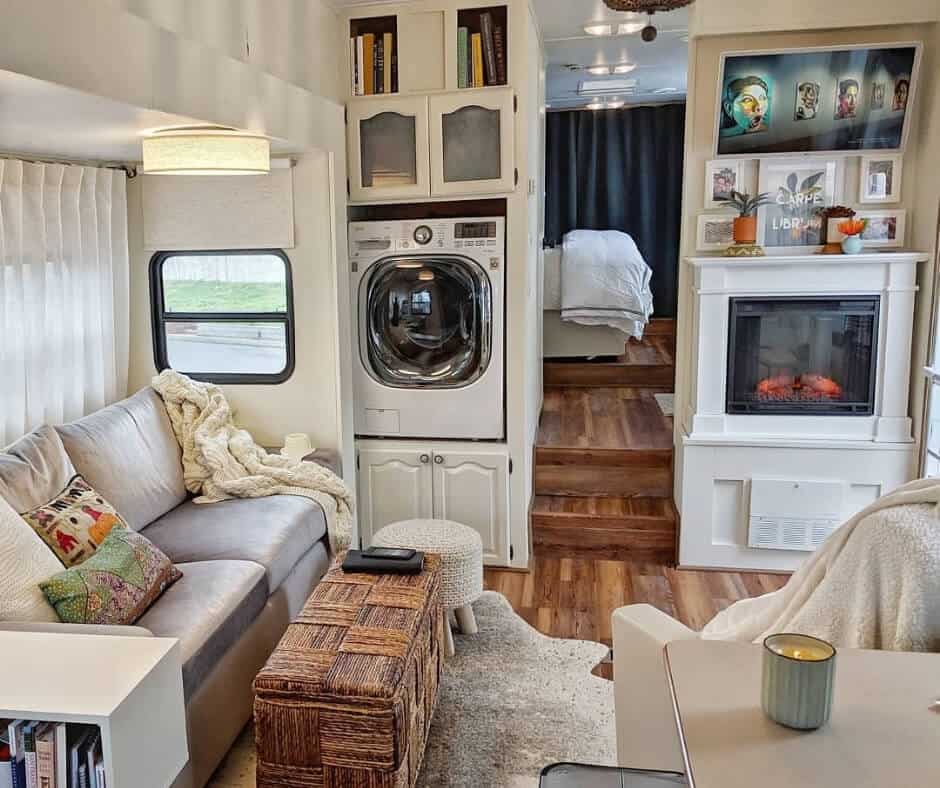
Plugging Your Camper in at Home: What Appliances Can You NOT Use?
Plugging your camper into your house generally won’t allow you to simultaneously run power hungry appliances like space heaters, hairdryers, and microwaves.You can get around this by only running one power-sucking appliance at a time.
That said, you will rarely – if ever – be able to run your air-conditioner while plugged into your house.
Air-conditioners usually hog so much power that they’ll trip most household breakers even if they’re the only thing running in your RV.
Can I Use the 220v Outlet for my Clothes Dryer/Oven to Plug in my RV?
Unfortunately, no.
Most electric stoves and clothes dryers in your home have a larger 220v outlet.
While this outlet might look like it’s made for your RV, trust us, it is not. In fact, even if you were to figure out a way to rig this up, you’d fry your RV’s electronics as soon as you plugged in.
So please do not try this.
All RVs large and small are wired up for 110v power and you will cause extreme damage if you try to run 220v power into your camper.
The good news is, your 220 volt outlet is not even compatible with any RV plug, so unless you perform some major modifications, it’s very hard to make this mistake!
Benefits of Plugging Your Camper into Your House
Even if you don’t plan on staying in your camper for awhile, there are many benefits to keeping it plugged in at home:
1. It will keep your batteries charged, allowing you to have 12volt power when not plugged in.
-
Just be sure to read your owner’s manual to make sure your battery charger is “smart” so it won’t overcharge your RV batteries.
2. It keeps your fridge running.
-
Let’s say you bring your camper out every weekend for football games… By leaving your camper plugged in, you can keep those game snacks and drinks cool in the fridge without having to move them.
3. Run ultrasonic pest controllers.
- These devices keep pests away with high-frequency sound, but they need power to keep running while you’re away.
4. You can power dehumidifiers.
- A great tool for keeping destructive moisture out of your camper.
I Keep Losing Power to My RV When Plugged Into My House. What Should I Do?
This usually happens when you pull too much power for your household outlet by running too many power-hungry appliances.
Remember that your air-conditioner will almost always not work when plugged into your house, so if you tried that and lost power to your RV, you know what the culprit is.
Or, perhaps you tried running the microwave and a hairdryer at the same time and power suddenly shut off?
Or, you may be plugged into an outlet that’s on a circuit with a low amp rating. Try plugging into an outlet in another part of the house to see if this resolves the problem.
In these cases, the most likely cause is that your household breaker has tripped, cutting off power to the outlet that you plugged your camper into.
This rarely causes damage, but is a message that you’re trying to pull too much power in your RV.
Simply shut off all electrical appliances in your RV, locate your home’s circuit breaker, and turn the tripped circuit back on.
Once you’ve done that, you should have power back to your camper. Just be sure not to repeat the mistake by running the devices (or combination of devices) that caused the power outage.
Always Use a Surge Protector When Your Travel Trailer is Plugged into Your House.
Surge protectors keep your RV electronics safe in the event that a power surge occurs.
If your RV is plugged into your house and the power grid surges, your camper’s electronics will get cooked – unless you have a surge protector.
RV surge protectors come in a variety of shapes, sizes, and prices, but they will generally attach to your RV power cord.
By attaching a surge protector as you plug your RV into your home, you’ll help protect against this costly situation.
Whether you plan to moochdock, live in your own driveway, or just want to keep your camper powered up when you’re not using it, you can plug your RV or travel trailer into your house.
Before you plug in, it’s important that you understand the limitations and benefits that come with plugging a 30 amp or 50 amp RV into a household outlet.

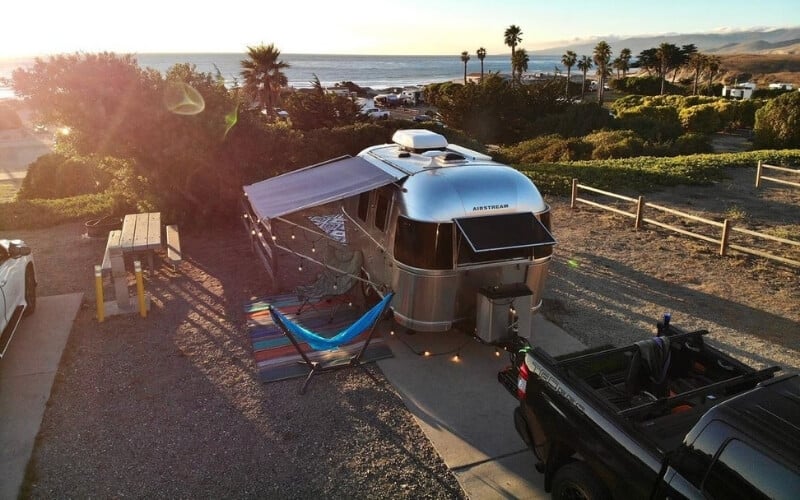
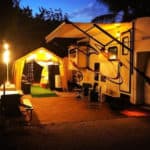
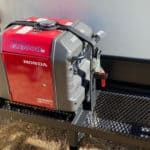
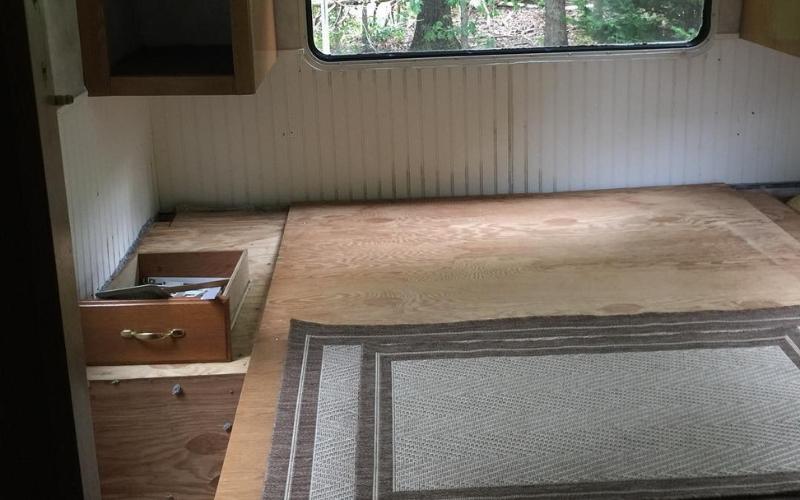
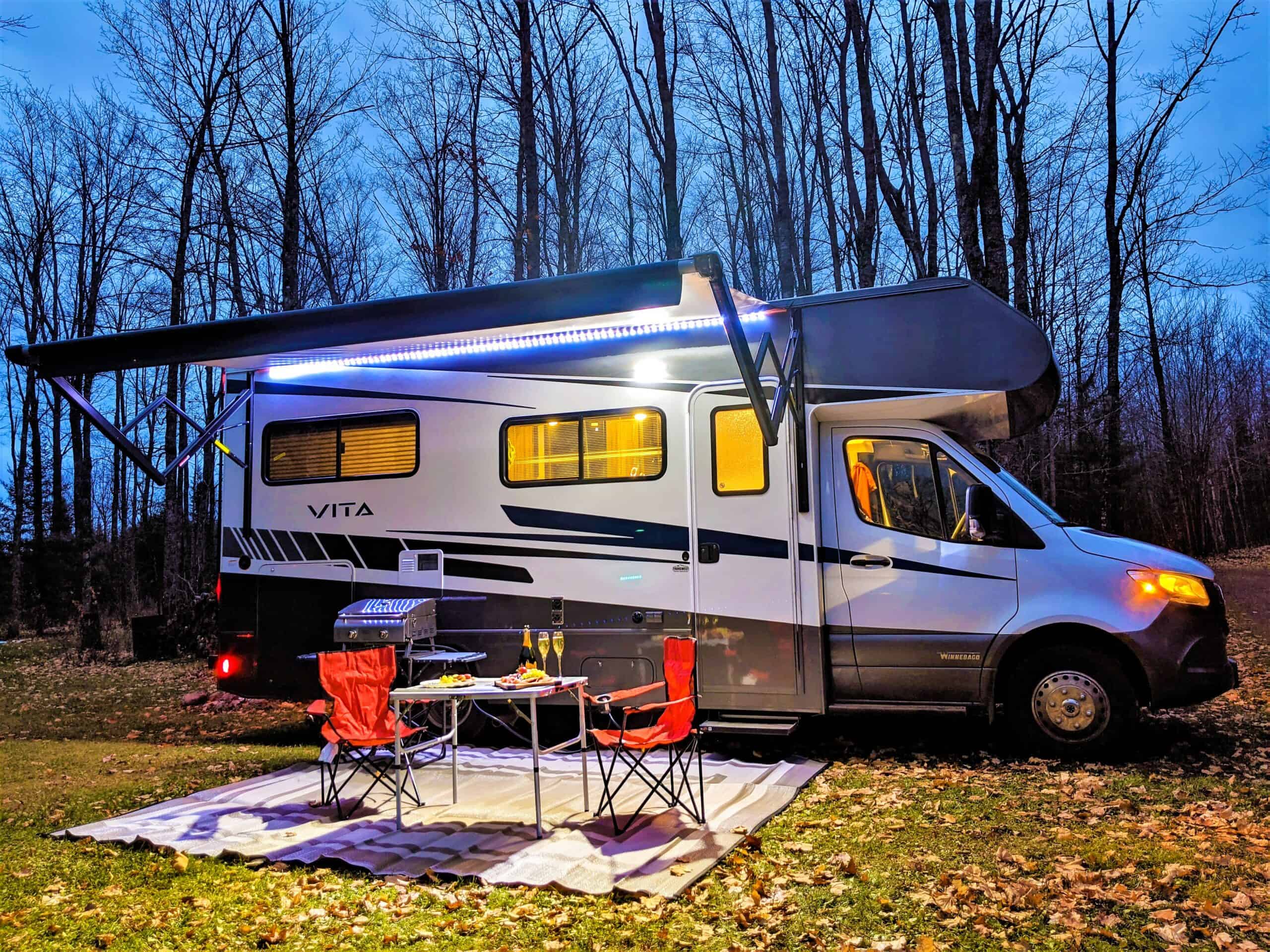
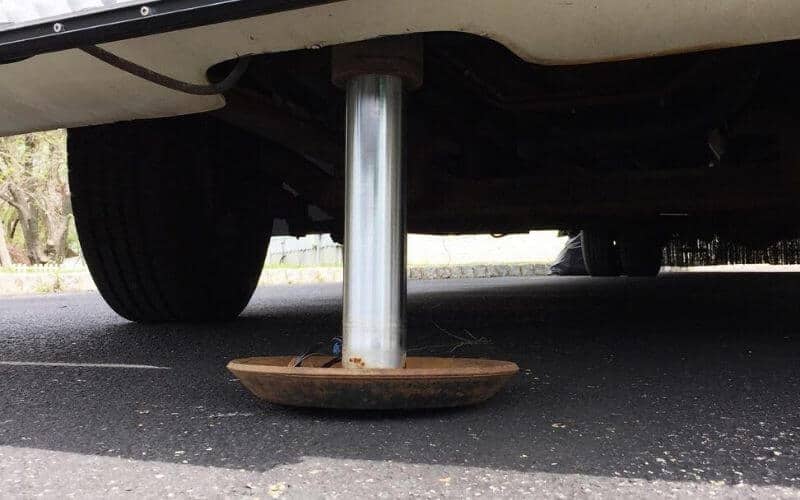
2 Comments
Barbara Steele
1 year agoI’m in my father’s driveway for the winter and for some reason I think I fried my electric blanket. Everything else that I e used on the same outlet is fine just not the blanket. Clues as to why????? Please and thank you.
Joseph Marinaro
8 months agoYou stated that houses have 5 Amp circuit breakers? Also please explain why you would fry something plugged into a stove or dryer, my guess is that it has no neutral. Regards, Joe